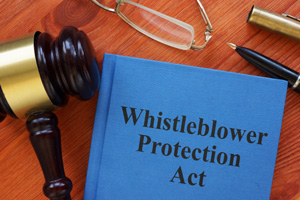
Whistleblower laws play a vital role in safeguarding the interests of public and private employees who uncover and report unlawful activities within their organizations. These laws exist to protect whistleblowers from retaliation and promote transparency and accountability, according to California Labor Code Section 1102.5. An employer may not enforce any rules, regulations, or policies preventing an employee from being a whistleblower. Additionally, an employer may not retaliate against an employee who is a whistleblower or for denying participation in an activity that would violate state or federal laws and regulations.
Under Section 1102.5, if an employer retaliates against a whistleblower, they may be required to reinstate employment and benefits, pay wages, and take other steps necessary to comply with the law. If you were retaliated against for reporting unlawful activity, speak with the leading employment lawyers at Blackstone Law.
What Protections Do Whistleblowers Have?
In California, several laws protect employees from whistleblower retaliation. These laws encourage employees to report unlawful activities and ensure against adverse actions by their employers. The key laws that provide such protections include the following:
Labor Code 1102.5
This section of the California Labor Code outlaws employers from retaliating against employees who disclose state and federal violations, rules, or regulations to a government or law enforcement agency. It also protects employees who refuse to engage in activities that would result in violations of the law.
Labor Code 98.6
This statute protects employees, particularly those who report violations to the California Labor Commissioner. Generally, complaints to the Labor Commissioner most likely involve wage and hour violations, such as:
- Violating minimum wage requirements
- Overtime pay violations
- Meal and rest break violations
As with Labor Code 1102.5, it also bans whistleblower retaliation against job applicant complaints about a previous employer with the Labor Commissioner.
Labor Code 6310
Section 6310 of the California Labor Code protects employees who report hazardous working conditions that may cause serious injury or death. It outlaws employers from retaliating against employees for reporting such conditions to appropriate authorities or the employer.
Government Code 8547
If you work for the state of California, you are protected under a unique whistleblower retaliation law that applies specifically to state public employees, known as the “California Whistleblower Protection Act.” It protects state employees who report any of the following:
- Violations of law, regulations, or court orders, including corruption, bribery, or fraud
- Conditions that may endanger the health or safety of employees or the public
- Activity that is economically wasteful or concerns gross misconduct, incompetency, or inefficiency
Speak with experienced employment lawyers to assess the unique circumstances of your case if you suffered retaliation as a public employee.
Your Legal Options if You Are a Victim of Whistleblower Retaliation
If you are a victim of whistleblower retaliation, you have several legal options to seek recourse and protect your rights. The following are some common legal avenues available to you:
- File a complaint: Before you initiate legal action, you may file a complaint with the California Labor and Workplace Development Agency to investigate the claim.
- File a lawsuit: You may pursue a lawsuit against your employer to recover damages.
The lawyers at Blackstone Law are prepared to help you navigate the process and protect your rights every step of the way.
Contact the Employment Lawyers at Blackstone Law
California employees have legal options to fight back and protect their rights if they are a victim of whistleblower retaliation. The lawyers at Blackstone Law can help you seek justice and hold your employer accountable.
Contact one of our award-winning employment lawyers by calling (310) 956-4054 or filling out a contact form for a free consultation.

